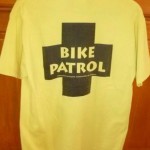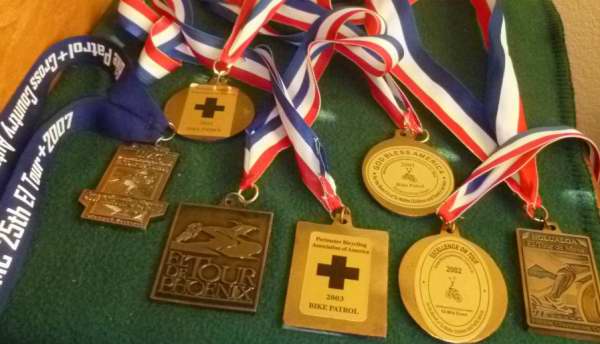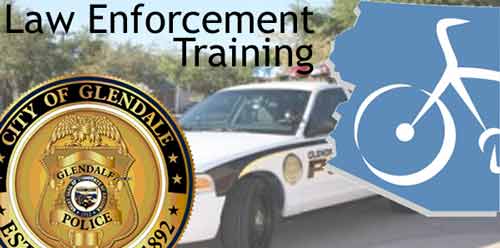visit www.cazbike.org/summit for all summit information
Curious about Bike Patrol?
 by Roseann Wagner
by Roseann Wagner
Having participated in bike patrol, I decided to talk to Walt Paciorek, an instructor of the program. Good events require a lot of time and organization led by dedicated people. Here is a way you can give back to a sport that has perhaps given you a great deal of fun.
The information is Walt’s take on the program. The pictures are mine.
The mission of Perimeter Bicycling’s Bike Patrol Program is to provide assistance, encouragement, and support for the participants of Perimeter events. Patrollers offer mechanical assistance, first aid as needed and encouragement to successfully finish the ride.
Perimeter Bike Patrol is a group of nearly 300 certified cyclists who bring enthusiasm for cycling and a deep pool of experience to ensure the success of thousands of riders in Perimeter events every year.
There is also an award for outstanding Bike Patrol in each event.
And of course, all Bike Patrol receive a finisher’s medallion.
Who can participate?
The typical bike patroller is a fit, experienced, and enthusiastic cyclist with basic mechanical skills (fix a flat, correct a thrown chain); knows and practices the rules and procedures of safe cycling, and is willing to assist and encourage other cyclists. A basic understanding of first aid is helpful but not required.
Different ride distances are available to accommodate all ages and sizes of riders. You ride at your own pace (preferably with a partner), but plan on many stops to help riders.
How much does it pay?
For a modest processing fee you get to ride a great event, a striking yellow tee-shirt, a cool medallion, excellent sag stops, and a priceless amount of appreciation and satisfaction. While maybe not rock-star status, you will receive many positive strokes from those you help or who have been helped by others in the past.
What do I have to do to qualify?
Register, attend a certification course, show up early to help at the start, and agree to do all you
can to ensure participants will have a safe and fun event. If you are uncertain about your qualifications, you may request to be paired with an experienced Bike Patroller or team. Review the Bike Patrol Manual (available on-line) before you attend the certification class. Classes are normally held several times each fall; and are held in both Phoenix and Tucson.
How long do I have to be at the event?
Be there early to help at the start, complete the ride, check in at the finish, pick up your
medallion, and then you are finished.
Why is patrol necessary?
A surprising number of riders will need your assistance. They appreciate getting back on the road promptly without a long wait for sag assistance. Bike Patrollers are the eyes and ears of the tour, ready to report or correct problems and assist with mechanical, medical, and motivational emergencies in real time.
Do I have to provide tubes and tire-changing tools?
You will be advised about what tools are useful at the certification class. You may receive a tube or two at packet pickup. Most riders will have their own tubes. A few will not. I always carry a few patched road bike tubes for those who need them and a glue-less (Park is the best) patch kit for odd-sized wheels.
What are other duties of bike patrol?
Assistance, encouragement, and support are paramount. Call in or text every time you stop to provide assistance, or at least at every sag stop. If you observe riders behaving badly or breaking event rules, ask them to mend their ways. If they do not cooperate, report their rider numbers and the circumstances via text, call, or at the next sag stop. There will be consequences.
What do I do if I encounter a crash?
Secure safety for any victims and, if serious, call 911. Provide any first aid that you comfortably can. Stay until help arrives or you are certain a rider can continue. Report the incident via text or call. Complete a report form for all but simple events handled on-site. There can be an events that will be challenging. Some examples I have encountered are hypothermia, hyponatremia, diabetic incidents, heat distress, and severe cramps. These are mid-level events that can be treated on-site if caught early, but can also require professional medical attention. You will make the call – treat, call for support/pickup, or call 911.
What should I do to be prepared?
Be sure your own bike is in good shape before the ride. Bring a fully-charged cell phone.
Between the Bike Patrol Manual and the certification class, you will be prepared. Ride with a partner for fun, efficiency in carrying out duties, and assistance when needed.
If you are interested in being a part of bike patrol, visit perimeterbicycling.com/bike-patrol to learn more and sign up.

Look Ma, no hands!
There is a special law applying specifically to bicyclists; it often gets repeated as
You must have at least one hand on the handlebars at all times
Which is what appears both on the Arizona Governor’s Office of Highway Safety (AZ GOHS), and the City of Phoenix websites, it is a misrepresentation.
While this is the law in some places, e.g. Utah (41-6a-S1112); the law in Arizona actually reads:
ARS 28-816. Carrying article on bicycle
A person shall not carry a package, bundle or article while operating a bicycle if the package, bundle or article prevents the driver from keeping at least one hand on the handlebars.
So, while you should and must ride under control for safety’s sake, it’s not intrinsically illegal to ride with no hands.
Fall 2015 BFC: Tempe and Mesa move up
 League Announces Fall 2015 Bicycle Friendly Communities
League Announces Fall 2015 Bicycle Friendly Communities
Tempe move up to Gold. Mesa moves up to Silver. Scottsdale maintains Gold.
Arizona communities currently enjoying BFC status are
- Gold — Tucson/East Pima Region, Scottsdale, Tempe
- Silver — Sedona, Flagstaff, Mesa
- Bronze — Chandler, Cottonwood, Gilbert, Phoenix
World Day of Remembrance for Road Crash Victims
November 15, 2015 is World Day of Remembrance for Road Crash Victims. Right here in Arizona in just the last year , 884 persons were killed in Arizona traffic crashes. This includes 589 motorists, 157 pedestrians, and 28 bicyclists. Many thousands more were injured.
This year the theme is “Crash Not Accident” – an initiative focused on changing the way we think and talk about crashes. Most crashes are not “accidents”, rather they should be viewed as preventable incidents. Yet, the “A” word which connotes some level of innocence, is the ubiquitous term used in describing these incidents by media, some highway safety officials & others. Negligent, and even criminal, drivers hide behind the word, as if “lack of intent” absolves them of their actions and the hurt that they’ve caused. #CrashNotAccident
ASU-Poly, and Downtown campus named Bicycle Friendly
The LAB announced today that the ASU’s Polytechnic campus and ASU’s Downtown Phoenix campus have been named Bicycle Friendly Universities at the Bronze Level. Continue reading ASU-Poly, and Downtown campus named Bicycle Friendly
Bicycle Law Enforcement
Police play an essential role in supporting bicycle transportation by enforcing the traffic laws that allow all road users to reach their destinations safely. As bicycle travel has grown in popularity, the public has asked law enforcement to become more involved in bicycling issues. This can present challenges for police, because misconceptions about safe bicycling practices and state law are widespread among the public. The Bicyclist Safety and Law Enforcement in-service training program was developed by the Coalition of Arizona Bicyclists in cooperation with the Glendale, AZ police department to provide the most accurate and relevant information available to Arizona police officers. The program covers relevant traffic laws, common crash types and frequency, best bicycling practices, and effective enforcement techniques so that law enforcement officers can be confident when discussing bicycling issues with the public, and can effectively prioritize related enforcement and outreach activities to promote public safety.

This brief e-learning training video that will be used internally for all Glendale Police officers. Most of the material refers to state-wide laws and statistics; and is not specific to Glendale. The material was adapted for use in Arizona by the Coalition from Education Resources for Police created by BikeWalk NC.
Special thanks for Glendale Police personnel for their help in developing and reviewing the presentation: Chief Deborah Black, Detective Dan Mooney, Detective Ted Yoder, Officer Andy Lynes, and narrator Bicycle Officer Brian Ong.
The presentation is available in the following forms
- Youtube video, ~ 18 minutes / presentation with spoken notes (or downloadable .mp4, for offline play, 97MBytes)
- Same as above but video but shortened to ~ 15 minutes by removing some Glendale-specific info.
- downloadable .pdf with slides and notes pages. ~ 3MBytes
.
.
The Fruits of Police Training

This is why training law enforcement is so important; beyond sworn officers, dispatchers should be informed as to the laws so as not to waste police resources on such non-issues. Do motorists call police when they are impeded by a slow-moving truck or bus? If they do, are police then dispatched? No, of course not, they would change lanes and pass; problem solved without any police intervention. News Item:
February 4 (2017): Traffic Hazard – 8:33 a.m. — Pacific Coast Highway and Seal Beach Blvd — the caller said approximately 30 bicyclists were taking up the entire no. 2 lane. According to police unit S21, none of the bicyclists were violating any laws. No further law enforcement services were required.
Police undoubtedly found bicyclists were indeed using the entire right-hand lane, and it was narrow; correctly determining this is not a violation, and is in fact the recommended and most safe lane position.
CAzBike Membership ANNUAL Meeting: Sat Oct 31, 2015
- Where: Radisson Hotel Chandler-Phoenix 7475 W Chandler Blvd, Chandler, AZ 85226 Located just east of I-10 on south side of Chandler Blvd.
- When: Sat Oct 31, 2015, room available 12 noon – 4pm. Meeting begins at 12:30p
At this point it looks like food will not be served.
The meeting is open to the public — please drop us a line if you plan to attend cazbike@cazbike.org of check-in on facebook.
Coalition of Arizona Bicyclists
2015 Annual Meeting
Agenda (12:30 pm – 4:00 pm)
Introductions of attendees
Treasurer’s Report
2015 – AZ Year in Review
Board Member Nominations/Elections
2016 – Priorities and Goals Discussion
Other Agenda Items (time permitting)
…
2015 – AZ Year in Review
Law Enforcement Training Module completed (joint effort with Glendale PD – Review/Discuss)
ADOT – Safety initiatives, policy shift? (Chandler Blvd bike lanes over freeway approved), BFS ranking (19th, down from 15th in 2014)
LAB – BFC, BFU additions (Phoenix, ASU)
Regional/Local Progress
Yuma – Bicycling events, bicycle safety, sidewalk riding, active Yuma Regional Bicycle Coalition, Bicycle Facility Master Plan, Rails-to-Trails project/infrastructure, etc.
Tucson/East Pima Region – Loop (55+ miles) expansion, bond issue TBD including Veldrome funding, Vulnerable User law push, etc.
Metro-Phoenix – Updated MAG bikeways map published/distributed, MAG canal path wayfinding/signage project approved, Mesa MTB park opens, Phoenix Proposition 104 passes (includes funding for multi-modal including >1,000 miles of bike lanes), Phoenix receives $10.3 M grant for canal path improvements, Tempe and MAG bike counts,
Sedona – New MTB park approved and under construction.
Flagstaff – 72 bike racks installed at 27 FUSD schools, Flagstaff Bicycle Safety Initiative.
Other?
2016 – Priorities and Goals Discussion
CAzB role discussion (advocate network/support vs general membership growth…or both, state and regional issues vs local involvement, focus on municipalities vs legislature…or both, etc.)
Opportunity/Push for Law Enforcement training elsewhere in AZ
State Bicycling Summit (4/1/16)
Tucson velodrome assistance (matching funds)
Pecos Freeway bicycle path/route/access
Fund-raising ideas discussion (including license plate)
Regional/local goals/objectives discussion
Tempe adds penalties for dangerous cell-phone using drivers
Tempe city council voted earlier this week to institute penalties on drivers who are driving erratically, or cause collisions due to handheld cell phone use. Notably, the penalty for “aggravated” use — in the case where a serious injury or death occurs — is criminal. The ordinance is reproduced below. News item Tempe OKs toughest texting and driving law in Arizona. Continue reading Tempe adds penalties for dangerous cell-phone using drivers
Coalition advertisements — watch for them!
Coalition ads will be appearing in the Nov/Dec 2015 issue of Tail Winds magazine, and BikeLife Cities magazine (Tempe / Mesa / and Tucson Fall 2015 editions). Watch for it!

The original files are available on our collateral google drive folder:
- CAzB_Ad2-forTailwinds.jpg ; 300dpi, 4.75″ X 6.25″ => 1425 x 1875
- CAzB_Ad2.pdf
.






